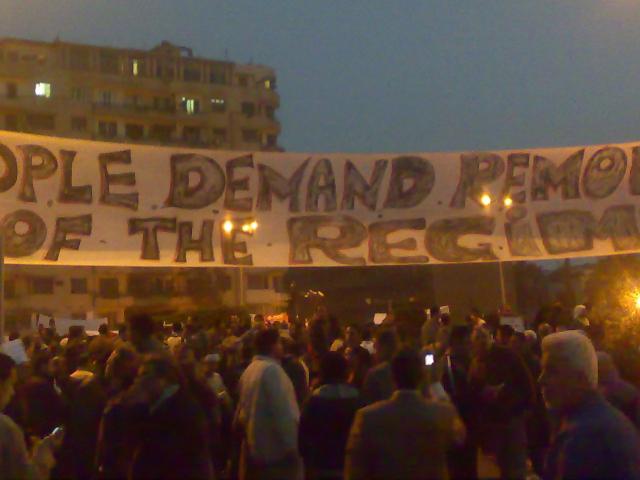
What Mubarak Must Do Before He Resigns
Press Release
As Egyptian citizens and human rights defenders, we have been on the streets here, including in Tahrir Square, since Jan. 25 to demand dignity and freedom for all Egyptians. There is nothing we want more than an immediate end to the Mubarak era, which has been marred by repression, abuse and injustice. We are heartened by the international community's shift from demanding "restraint" and "responsiveness" to echoing our call for Hosni Mubarak to step down and for an immediate transition toward democracy.
But for a real transition to democracy to begin, Mubarak must not resign until he has signed decrees that, under Egypt's constitution, only a president can issue. This is not simply a legal technicality; it is, as Nathan Brown recently blogged for ForeignPolicy.com, the only way out of our nation's political crisis.
Egypt's constitution stipulates that if the president resigns or his office becomes permanently "vacant," he must be replaced by the speaker of parliament or, in the absence of parliament, the chief justice of the Supreme Constitutional Court. In the event of the president's temporary inability to exercise his prerogatives, the vice president is to take over as the interim head of state. In both cases a new president must be elected within 60 days. Significantly, the constitution prohibits the interim president from introducing constitutional amendments, dissolving parliament or dismissing the cabinet.
If today Mubarak were no longer available to fulfill his role as president, the interim president would be one of two candidates. If he chooses to leave the country, say for "medical reasons," the interim president would be Omar Suleiman, the former intelligence chief who was recently made vice president. Egyptians, particularly those of us calling for an end to Mubarak's three-decade rule, see Suleiman as Mubarak II, especially after the lengthy interview he gave to state television Feb. 3 in which he accused the demonstrators in Tahrir Square of implementing foreign agendas. He did not even bother to veil his threats of retaliation against protesters.
On the other hand, if Mubarak is pushed to resign immediately we would have an even worse interim president: Fathi Surur, who has been speaker of the People's Assembly since 1990. Surur has long employed his legal expertise to maintain and add to the arsenal of abusive laws that Mubarak's regime has used against the Egyptian people. Since neither Suleiman nor Surur would be able to amend the constitution during the interim tenure, the next presidential election would be conducted under the notoriously restrictive election rules Mubarak introduced in 2007. That would effectively guarantee that no credible candidate would be able to run against the interim president.
So before Mubarak resigns he must sign a presidential decree delegating all of his authorities to his vice president until their current terms end in September. Mubarak issued similar decrees, transferring his powers to the prime minister, when he was hospitalized in 2004 and 2009. In addition, Mubarak must issue decrees lifting the "state of emergency" that has allowed him to suppress Egyptians' civil liberties since 1981 and ordering the release or trial of those held in administrative detention without charge - estimated to be in the thousands.
Also before Mubarak resigns, an independent commission of respected judges, constitutional law experts, civil society representatives and all political movements should draft language to amend the constitution to ensure that presidential elections are open to all credible candidates; that Egyptians abroad are allowed - for the first time - to vote; that any elected president is allowed to serve only two terms; and that the elections are supervised by judicial and civil monitors. Most of this will be a matter of undoing the damage Mubarak inflicted with his constitutional changes in 2007.
These amendments must be introduced in parliament and put to a public referendum immediately. Suleiman's claim that time is short is unfounded and disingenuous; four years ago, Mubarak and his ruling party amended 34 articles of the constitution in only two months.
Next, a diverse caretaker government must be appointed to serve the people until a president is elected and, importantly, to oversee the interim president. This broad-based cabinet must include well-respected representatives of all the country's political forces. Once a new president is elected, we can move toward drafting a constitution that ensures Egypt's transformation from a dictatorship to a democracy and enshrines full equality and human rights. Free and fair parliamentary elections would follow.
Three additional elements are key for the transition to succeed: First, civilian oversight of the police and security forces will deter abuse, hold abusers accountable, and help ensure the safety of those participating in the democratic uprising. Second, establishing an independent board of trustees for state television and radio would ensure neutrality in programming and representation of all political views. Third, a strong commitment by the army to act as a neutral custodian of the transition, serving the interests of the people and not the delegitimized regime, is critical.
Egyptians have paid a heavy price the past three decades and an even steeper one since this revolution started. Let's end Mubarak's rule the right way so we can start building a better future.
The Washington Post
By Hossam Bahgat and Soha Abdelaty
Saturday, February 5, 2011
Hossam Bahgat and Soha Abdelaty are, respectively, executive director and deputy director of the Egyptian Initiative for Personal Rights (www.eipr.org)



